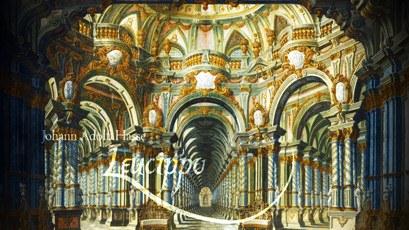Johann Adolph Hasse - Leucippo (2014)
Johann Adolph Hasse - Leucippo (2014)

01 - 18 Acte I 19 - 34 Acte II 35 - 52 Acte III Leucippo - Vasily Khoroshev (Counter-tenor) Narete - Francisco Fernández-Rueda (Tenor) Dafne: - Franziska Gottwald (Soprano) Climene - Netta Or (Soprano) Delio - Claudia Rohrbach (Soprano) Nunte - Holger Falk (Bass) Barock Vokal Mainz Concerto Köln Konrad Junghänel - conductor Incomplete performance, missing 2 arias: Dafne's aria "Ne felice o pastorella" from Act I Scene 3 replaced by Dafne's aria from Act II Scene 11, and Leucippo's final aria of Act I "Cosi geloso il cane", along with numerous cuts of the recitatives. Live performance from the Schwetzingen SWR Festspiele at the Rokokotheater on May 25, 2014.
Arcadia. Locus amoenus of classical antiquity. A collective literary fantasy of bucolic peace and simplicity, the long-lost earthly paradise of medieval yearning, a Rousseauesque utopia of Enlightenment idealism. This poetic dreamland, peopled by shepherds and shepherdesses whose sole purpose in life is philosophical reflection – mainly about the joys and pains of love – has had a long life in the cultural imagination of Europe.
Leucippo was first performed on 7 October 1747 at the Jagdschloss Hubertusburg near Dresden on the occasion of the Elector Friedrich August II’s birthday, who was Hasse’s Saxonian employer until his death in 1763. It tells the story of two star-crossed Arcadian lovers, Aristeo (Valer Sabadus) and the nymph Dafne (Regina Richter), who, in turn, is pursued by Delio, the god Apollo disguised in human form (Claudia Rohrbach). There is trouble in paradise, for ‘Et in Arcadia Ego’. In librettist Giovanni Claudio Pasquini’s utopia, love is a threat to the simple innocence of the Arcadian populace, the greatest and only evil and therefore considered a crime punishable by death. It falls on the priest of Apollo, Narete (Kenneth Tarver), to punish Aristeo for his transgression against the god. However, unbeknownst to both, Aristeo (Leucippo) is really Narete’s son, which is why at first, out of affection for the boy, he seems content to let Aristeo live and send him into exile instead. But Dafne’s enduring protestations of love for the shepherd finally convince Narete that the blasphemer must die. Torn between his inexplicable affection for the boy and duty to his god, he has him followed, arrested, and condemned anew. Neither his daughter Climene (Klara Ek), nor her lover, Aristeo’s friend Nunte (Luke Stoker), nor, after much prevarication, Delio/Apollo can persuade Narete to stay his sword. However, unable to endure the prospect of her beloved’s death, Dafne pre-empts Arcadia’s laws and kills herself in her lover’s place. Aristeo, at last revealed as Narete’s long-lost son Leucippo, follows suit. The lovers are united in death – a happy ending of sorts – but the survivors stare at each other in shock. Innocence is gone. What remains is the knowledge of Love and Death, Eros and Thanatos. Arcadia is no more. ---Tullia Giersberg, bsecs.org.uk
download (mp3 @256 kbs):
yandex mediafire uloz.to cloudmailru gett








